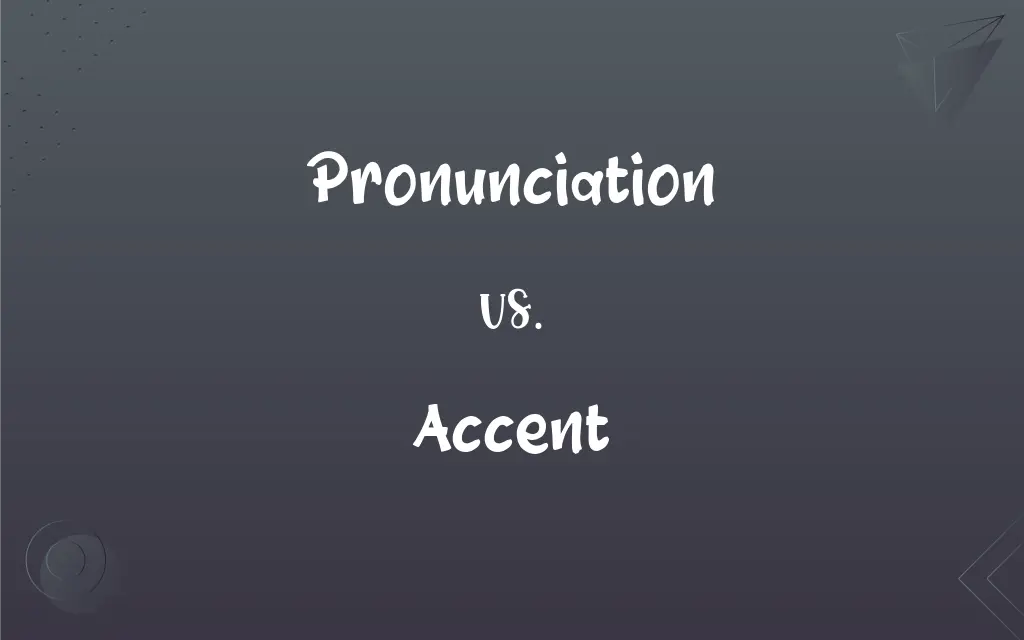Pronunciation vs. Accent: What's the Difference?
By Janet White || Published on December 24, 2023
Pronunciation is the way in which a word is spoken, while accent refers to distinctive speech patterns associated with a particular region, social group, or nationality.

Key Differences
Pronunciation involves the correct formation of word sounds, focusing on how individual words should be spoken. Accent encompasses the unique speech characteristics, including tone, pitch, and rhythm, of a particular group.
Good pronunciation requires understanding phonetics and the specific sounds of a language, while an accent reflects regional or cultural variations in speech.
Pronunciation can be standardized within a language, such as the Received Pronunciation in English. Accents, however, vary widely even within the same language, indicating the speaker's geographical or social background.
Mispronunciation can lead to misunderstandings or incorrect word usage, while a strong accent might affect comprehensibility but doesn't imply incorrect language use.
Learning a new language involves mastering its pronunciation, whereas acquiring an accent often happens naturally through immersion in a specific language community.
ADVERTISEMENT
Comparison Chart
Definition
The way in which words are spoken
Distinctive speech patterns of a particular region or group
Focus
Correct sound formation of individual words
Overall speech characteristics including tone and rhythm
Variation
Can be standardized within a language
Varies widely even within the same language
Impact on Communication
Incorrect pronunciation can lead to misunderstandings
Strong accents may affect comprehensibility but are not incorrect
Acquisition
Learned through study of phonetics
Often acquired naturally through immersion
ADVERTISEMENT
Pronunciation and Accent Definitions
Pronunciation
The act or manner of pronouncing words.
Her pronunciation of 'schedule' was perfect.
Accent
A manner of pronunciation peculiar to a particular individual, location, or nation.
His accent revealed his French background.
Pronunciation
The way in which a word is expressed verbally.
Pronunciation of foreign words can be challenging.
Accent
A distinctive way of pronouncing a language, associated with a particular country, area, or social class.
She speaks with a British accent.
Pronunciation
Articulation of speech sounds in a prescribed manner.
Good pronunciation is essential for clear communication.
Accent
The characteristics of speech that indicate the speaker's regional or social identity.
The accent in the southern states is quite distinctive.
Pronunciation
The way in which a speaker produces the sounds of words.
Pronunciation varies between different dialects of the same language.
Accent
A way of speaking typical of a particular group of people.
The local accent was hard for outsiders to understand.
Pronunciation
The standard way in which a language's words are spoken.
He worked hard on his English pronunciation.
Accent
Variation in speech sounds that indicates a person's origins or social background.
Her accent changes slightly when she's with her family.
Pronunciation
The act or manner of pronouncing words; utterance of speech.
Accent
The relative prominence of a particular syllable of a word by greater intensity or by variation or modulation of pitch or tone.
Pronunciation
A way of speaking a word, especially a way that is accepted or generally understood.
Accent
Vocal prominence or emphasis given to a particular syllable, word, or phrase.
Pronunciation
A graphic representation of the way a word is spoken, using phonetic symbols.
Pronunciation
(countable) The formal or informal way in which a word is made to sound when spoken.
What is the pronunciation of "hiccough"?
Pronunciation
(uncountable) The way in which the words of a language are made to sound when speaking.
His Italian pronunciation is terrible.
Pronunciation
(countable) The act of pronouncing or uttering a vocable.
Pronunciation
The act of uttering with articulation; the act of giving the proper sound and accent; utterance; as, the pronunciation of syllables of words; distinct or indistinct pronunciation.
Pronunciation
The mode of uttering words or sentences.
Pronunciation
The art of manner of uttering a discourse publicly with propriety and gracefulness; - now called delivery.
Pronunciation
The manner in which someone utters a word;
They are always correcting my pronunciation
Pronunciation
The way a word or a language is customarily spoken;
The pronunciation of Chinese is difficult for foreigners
That is the correct pronunciation
FAQs
Can pronunciation affect understanding in communication?
Yes, incorrect pronunciation can lead to misunderstandings, as it might change the meaning of words or make them difficult to recognize.
What are phonemes in English pronunciation?
Phonemes are the smallest units of sound in a language that distinguish one word from another, like the sounds /p/ and /b/ in "pat" and "bat."
Is watching English movies a good way to learn pronunciation?
Yes, watching movies in English can help you hear natural speech patterns and improve your pronunciation and listening skills.
What is the difference between pronunciation and accent?
Pronunciation refers to the way in which words are pronounced, following phonetic norms, while an accent is the distinctive way of pronouncing a language, often influenced by the speaker's native language or regional speech patterns.
Is it necessary to lose my accent to speak English well?
No, you don't need to lose your accent to speak English well. Clear pronunciation and effective communication are more important than eliminating an accent.
How can I improve my English pronunciation?
Practice regularly, listen to native speakers, use language learning apps, and consider getting feedback from a language tutor.
Are there any tools to help with English pronunciation?
Yes, there are many tools such as pronunciation guides, online dictionaries with audio, language learning apps, and speech recognition software.
Does singing in English help with pronunciation?
Yes, singing can help you practice rhythm, stress, and intonation in a fun and engaging way.
How can I practice English pronunciation on my own?
Record yourself speaking, compare with native speakers, use language apps, and repeatedly practice troublesome sounds.
Why is intonation important in English pronunciation?
Intonation conveys meaning and emotion in speech, helping to indicate questions, statements, and emphasis.
What are some common pronunciation mistakes by non-native speakers?
Common mistakes include mispronouncing vowel sounds, incorrect word stress, and not using the correct rhythm or intonation.
What is a 'schwa' sound in English?
The 'schwa' is a neutral vowel sound (like the 'a' in 'about' or the 'e' in 'problem') and is the most common vowel sound in English.
Is it better to learn British or American pronunciation?
It depends on your personal preference, goals, and which variant of English you are more exposed to or need to use.
Can reading out loud improve my English pronunciation?
Yes, reading out loud is an excellent way to practice pronunciation, rhythm, and intonation.
Are tongue twisters useful for improving pronunciation?
Tongue twisters are great for practicing specific sounds and improving articulation in a fun and challenging way.
Why do British and American English sound different?
They have different accents due to historical, cultural, and geographical influences that have caused the languages to evolve differently.
Can learning phonetic symbols help with pronunciation?
Yes, learning the International Phonetic Alphabet (IPA) can help you understand how to produce specific sounds.
How can I improve my English accent?
Listen to native speakers, mimic their speech patterns, work on pronunciation, and reduce influences from your first language.
Why do I have an accent when I speak English?
Accents develop when learning a new language because of the influence of your native language and its phonetic patterns.
How important is rhythm in English pronunciation?
Rhythm is crucial as English is a stress-timed language, and proper rhythm helps in making your speech more natural and understandable.
About Author
Written by
Janet WhiteJanet White has been an esteemed writer and blogger for Difference Wiki. Holding a Master's degree in Science and Medical Journalism from the prestigious Boston University, she has consistently demonstrated her expertise and passion for her field. When she's not immersed in her work, Janet relishes her time exercising, delving into a good book, and cherishing moments with friends and family.






































































